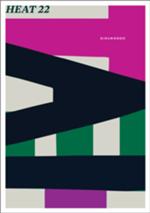First published in 1996, HEAT is a literary magazine dedicated to publishing essays, fiction and poetry by Australian and overseas writers of the highest quality. Recent contributors include Antigone Kefala, Eliot Weinberger, Xi Xi, Katerina Gibson, Lena Andersson, Paul Muldoon, Fiona Kelly McGregor, Mariana Enrquez, David Sornig, Max Easton, Isabella Trimboli, Eda Gunaydin, Noemi Lefebvre, Gareth Morgan, Ender Baskan, Jenny Erpenbeck, Oliver Driscoll, Mary Jean Chan, Amitava Kumar, Fiona Wright, Oscar Schwartz, Zang Di, Hanne rstavik, Katharina Volckmer, Kate Middleton, and Noelle Janaczewska. HEAT’s third series (2022) is edited by Anna Thwaites and designed by award-winning designer Jenny Grigg. ‘The revival of HEAT journal has been one of the high points of the year. In the 1990s and 2000s, HEAT was the most exciting, forward-looking literary magazine in the country. After more than a decade on ice, this new series has raised the bar once again. Elegantly designed and thoughtfully curated, and including work from canonical Australian writers to emerging voices to authors in translation, the journal reminds us how crucial such organs are to the vigour and health of our literary ecosystem.’ Geordie Williamson, The Saturday Paper’s ‘Best of 2022’ ‘So slender and elegant, nothing wasted, nothing grandiose and beautiful work.’ Helen Garner ‘HEAT magazine was a trailblazer from the day it was launched…[The new series is] still dedicated to publishing non-Anglophone views of the world, alternatives to the mainstream and points of view that are both thought-provoking and expressed in high literary style.’ Openbook, NSW State Library Magazine ‘A very beautiful and stylish object…long may this new series of HEAT continue!’ Sarah Holland-Batt ‘I welcome the return of HEAT. Readers and writers alike will revel in its daring audacity, bold exploration and innovative celebration of literature.’ Alexis Wright ‘HEAT is eclectic and eccentric, bold and often feisty, and above all else, it is a journal that always gives a freer rein to its writers, that we might gallop wherever we will.’ Fiona Wright

Heat 22
ISBN: 9781923106468
Format: Paperback
Publisher: Giramondo Publishing Co (ADS)
Origin: AU
Release Date: November, 2025
154539

